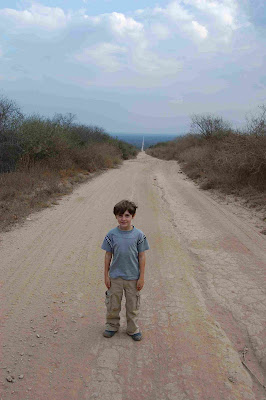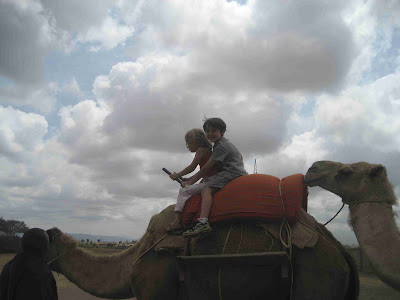
From the whole family:
Background: Scott had a three-day work trip to the Kiteto District well south of Arusha. We were meeting with several villages interested in establishing the Makame Wildlife Management Area (WMA). WMA’s are a new Tanzania land management category established to conserve wildlife while directing compatible economic benefits to local communities. It involves transferring land ownership and wildlife authority from the government to a village. The day before, Scott participated in a signing of WMA near Mount Kilimanjaro and transfer of land to several villages in an emotional ceremony. On this trip, stops included meeting with a village assembly to hear their goals, needs, and challenges and visits with district officials responsible for overseeing the process. AWF staff discussed the benefits, challenges, and process to establishing a WMA with both groups.
Angela and the kids didn’t want to be left alone in the roach motel so they came along with me, looking forward to an outing with good hotels and meals. They decided that the described six hour trip would be worth it.
Things didn’t turn out exactly as expected…….. The trip was an unvarnished view of rural Tanzanian life and we learned many things about Maasai culture.
Lesson #1. Time is relative in the Maasai culture. The six hour trip was actually ten – twelve hours each day of continuous driving along the most isolated, rutted dirt roads we have traveled. We passed three towns and a few dozen vehicles in three days. We named our very capable driver, Flying Ali. Angela says she lost five pounds but aged six years. By the last day, we had negotiated a five minute roadside break every two hours.

Lesson# 2. The Maasai do not take food or water with them all day while out grazing their cattle. Lunch was at 3:30 PM. Dinner was at 9:00 PM. The last minutes snacks we brought were a lifesaver.
Lesson #3. Facilities away from the safari circuit are, er, um…… modest. During lunch, Annie curled on Angela’s lap crying while Charlie watched the crowing rooster tied to the table leg with great interest and enthusiastically said “And Dad, did you see how they store their meat?” We looked up to see sides of beef in an unrefrigerated case hanging on the wall. Annie started crying harder. Morning breakfast of hot chapati at roadside stands (even if sanitary preparation was questionable) became a treat.


Lesson #4. Even staying at the nicest guesthouse in town (two bumpy hours from the meeting location) does not guarantee a toilet. But these porcelain squatty potties are a step-up from the “hole” typical of any rural community. Toilet paper is rare. The buckets are for washing off afterwards. Electricity is reserved for 6-11PM. Getting on the road by 6 AM necessitates a headlamp.


Lesson # 5: Many Maasai in rural areas have never seen a mzungu (white person). We only saw one over the three day trip (an NGO worker). Blonde haired and blue-eyed young girls are a particular attraction. Unlike the States, where staring is done surreptitiously, in rural African areas, prolonged gawking by adults and children is accompanied by pointing, laughing, incessant chatter, and banging on the vehicle windows, as you would at a zoo to get any caged and displayed animal’s attention.

Lesson# 6: You can fit a lot of Maasai in a Toyota land cruiser. Vehicles are very uncommon traveling between rural villages. The Maasai always help each other out with all of life’s tasks and travel is no exception. We regularly picked up and dropped off Maasai on our journey. At village stops, crowds quickly form at the doors of departing vehicles. In one instance, a half hour group discussion and negotiation session ensued, which was mediated by the village leader. It was decided that ten village members was a good number to join Angela, Charlie, Steven, and Ali in their land cruiser for the three hour drive to the next village.

Lesson #7. Maasai women often are married at a young age. The friendships they form with their husband’s other wives must be a big help. The Maasai village leader in the vehicle with Annie and I took a liking to her immediately (In the picture, he is the man next to the one wearing my binoculars). I almost got her married off for ten cows and some goats. I had to throw in my binoculars and watch because of her young age and inability to help much around the boma.

Lesson # 8: Vomiting Maasai passengers are no reason to pull over. Because they do not ride in vehicles very often, the roads are very rough, the drivers fast, and they are packed efficiently, they get car sick easily. The vomit flowed freely and was sometimes caught in their Maasai cloths and sometimes just ended up on our luggage. After an hour, we came to a small village. After a brief stop, someone obtained plastic bags which helped for the second half of the trip. Even though the dust was a problem, we kept the windows rolled down because of the smell. Upon arrival at their final destination, they piled out quickly, but their gift remained with us for the rest of our trip. In return, we left them a bag, sweatshirt, and hat from the back of the truck that we no longer wanted.


Lesson # 9. The Maasai get to set fires. Lots and lots of fires to maintain grazing land, reinvigorate tender grass for cattle, and reduce ticks. We passed Maasai on bicycles, setting spot fires every few kilometers.

Needless to say Angela and the kids won’t be coming on any more work trips.

















